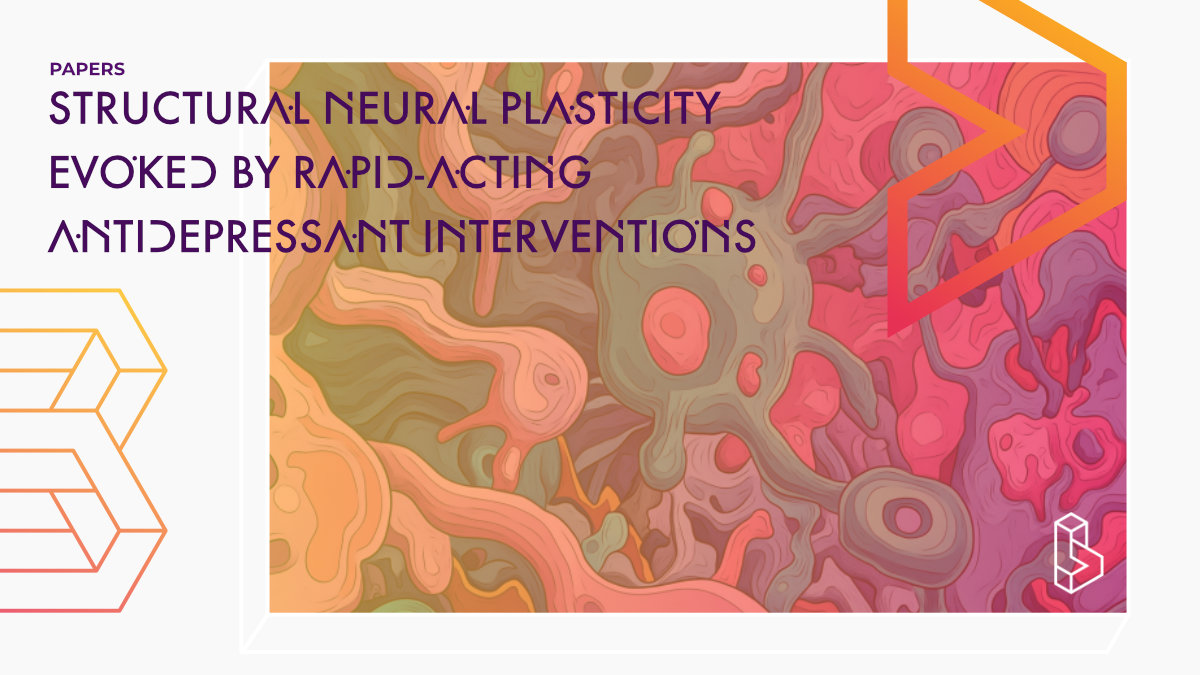This review (2024) highlights preclinical research from the past 15 years showing that ketamine and psychedelics trigger dendritic spine growth in cortical pyramidal neurons, enhancing neural plasticity. It compares the longitudinal effects of psychoactive drugs, emphasizing rapid-onset and sustained structural plasticity as key features of rapid-acting antidepressants, and discusses gaps in understanding and prospects for other interventions like rTMS.
Abstract of Structural neural plasticity evoked by rapid-acting antidepressant interventions
“A feature in the pathophysiology of major depressive disorder (MDD), a mood disorder, is the impairment of excitatory synapses in the prefrontal cortex. Intriguingly, different types of treatment with fairly rapid antidepressant effects (within days or a few weeks), such as ketamine, electroconvulsive therapy and non-invasive neurostimulation, seem to converge on enhancement of neural plasticity. However, the forms and mechanisms of plasticity that link antidepressant interventions to the restoration of excitatory synaptic function are still unknown. In this Review, we highlight preclinical research from the past 15 years showing that ketamine and psychedelic drugs can trigger the growth of dendritic spines in cortical pyramidal neurons. We compare the longitudinal effects of various psychoactive drugs on neuronal rewiring, and we highlight rapid onset and sustained time course as notable characteristics for putative rapid-acting antidepressant drugs. Furthermore, we consider gaps in the current understanding of drug-evoked in vivo structural plasticity. We also discuss the prospects of using synaptic remodelling to understand other antidepressant interventions, such as repetitive transcranial magnetic stimulation. Finally, we conclude that structural neural plasticity can provide unique insights into the neurobiological actions of psychoactive drugs and antidepressant interventions.”
Authors: Clara Liao, Alisha N. Dua, Cassandra Wojtasiewicz, Conor Liston & Alex C. Kwan
Summary of Structural neural plasticity evoked by rapid-acting antidepressant interventions
The authors begin by discussing the structural changes in dendritic spines—small protrusions on neurons where excitatory synapses form—observed in major depressive disorder (MDD). These changes are linked to impaired excitatory synaptic connections in the prefrontal cortex. Rapid-acting antidepressants like ketamine and certain psychedelic substances, as well as treatments such as electroconvulsive therapy (ECT) and repetitive transcranial magnetic stimulation (TMS), promote structural neural plasticity. The study aims to explore how these treatments induce synaptic rewiring, focusing on dendritic spines and their relationship to neural circuit function.
Major depressive disorder (MDD) varies in severity and is particularly challenging to treat in its “treatment-resistant” form, where first-line drugs like selective serotonin reuptake inhibitors (SSRIs) often fail. These alternative interventions demonstrate faster therapeutic onset compared to conventional treatments. By enhancing synaptic plasticity, they appear to counteract the synaptic deficits characteristic of MDD. The researchers emphasise that preclinical studies tracking dendritic spine changes can reveal how these treatments impact the structural integrity of neurons.
The introduction outlines the goal to integrate findings on excitatory synaptic deficits in MDD, preclinical evidence of antidepressant-evoked structural plasticity, and translational opportunities for advancing treatments.
Excitatory Synaptic Deficits in Depression
Synaptic and Morphological Abnormalities
Find this paper
Structural neural plasticity evoked by rapid-acting antidepressant interventions
https://doi.org/10.1038/s41583-024-00876-0
Paywall | Google Scholar | Backup | 🕊
Cite this paper (APA)
Liao, C., Dua, A. N., Wojtasiewicz, C., Liston, C., & Kwan, A. C. (2024). Structural neural plasticity evoked by rapid-acting antidepressant interventions. Nature Reviews Neuroscience, 1-14.
Study details
Compounds studied
Ketamine
Psilocybin
5-MeO-DMT
Topics studied
Neuroscience
Study characteristics
Literature Review

